Public:Competitive Environment: Difference between revisions
| (28 intermediate revisions by the same user not shown) | |||
| Line 1: | Line 1: | ||
==Competition environment categories== | ==Competition environment categories== | ||
{{further|1=[https://community.furtherium.com/t/competitive-landscape-furtherium-advantage/82/2 Competitive landscape] | {{further|1=[https://community.furtherium.com/t/competitive-landscape-furtherium-advantage/82/2 Competitive landscape]|2=|3=|4=|5=|6=|7=|8=|9=|10=}} | ||
=== | ===Tactical Situational Awareness (Head-Up Display, AR helmet, wearable devices)=== | ||
{| class="wikitable" | |||
! style="width: 25%" |are solving the same problem | |||
! style="width: 25%" |are using similar technologies | |||
! style="width: 25%" |are more than 10% alike | |||
! style="width: 25%" |are non-competitors | |||
|- | |||
|[https://wiki.furtherium.com/wiki/Public:ARHUDFM_FAQ#how_it's_similar_to_the_competitors'_products Microsoft IVAS] <ref>Breaking Defense, [https://breakingdefense.com/2024/08/army-open-to-replacing-microsoft-as-ivas-prime-under-ivas-next-industry-sources-say/ Army open to replacing Microsoft as prime under ‘IVAS Next,’ industry sources say] (Aug 15, 2024)</ref> | |||
|[https://www.dauntlessxr.com/ Dauntless XR] | |||
|Unknown | |||
|Meta Quest 3, Meta Quest Pro | |||
|- | |||
|[https://wiki.furtherium.com/wiki/Public:ARHUDFM_FAQ#how_it's_similar_to_the_competitors'_products L3Harris ENVG-B] | |||
|[https://letinar.com/ LetinAR] | |||
| | |||
|Apple Vision Pro | |||
|- | |||
|[https://www.elbitamerica.com/night-vision Elbit Systems SBNVG] | |||
|[https://www.vuzix.com/ Vuzix] | |||
| | |||
|PlayStation VR 2 (PSVR 2) | |||
|- | |||
|[https://wiki.furtherium.com/wiki/Public:ARHUDFM_FAQ#how_it's_similar_to_the_competitors'_products SMASH] | |||
|[https://www.thefirearmblog.com/blog/2020/10/30/envg-psq-20/ Nicholas C] | |||
| | |||
|HP Reverb G2 | |||
|- | |||
|[https://www.ara.com/arc4/ ARC4] | |||
|[https://www.technifexxr.com/ Technifex XR] | |||
| | |||
|Valve Index VR kit | |||
|- | |||
|[https://wiki.furtherium.com/wiki/Public:ARHUDFM_FAQ#how_it's_similar_to_the_competitors'_products Red6] | |||
|[https://www.eolianvr.com/ EolianVR] | |||
| | |||
|Bigscreen Beyound | |||
|- | |||
|Kopin | |||
| | |||
| | |||
|HTC Vive Pro 2 | |||
|- | |||
|BAE Systems | |||
| | |||
| | |||
| | |||
|} | |||
1. [https://wiki.furtherium.com/wiki/Public:ARHUDFM_FAQ#how_it's_similar_to_the_competitors'_products Microsoft IVAS] - poorly suited for military use: | ===Gunfire Locator=== | ||
{| class="wikitable" | |||
! style="width: 25%" |are solving the same problem | |||
! style="width: 25%" |are using similar technologies | |||
! style="width: 25%" |are more than 10% alike | |||
! style="width: 25%" |are non-competitors | |||
|- | |||
|[https://www.rtx.com/who-we-are/we-are-rtx/transformative-technologies/bbn/boomerang RTX (Raytheon BBN) Boomerang] | |||
| | |||
| | |||
| | |||
|- | |||
|[https://www.qinetiq.com/en-us/what-we-do/services-and-products/ears-gunshot-localization-systems QinetiQ EARS] | |||
| | |||
| | |||
| | |||
|- | |||
|[https://www.metravib-defence.com/our-solutions/pearl-soldier-protection/ Metravib Defence PILAR] | |||
| | |||
| | |||
| | |||
|- | |||
|[https://www.iai.co.il/sites/default/files/2022-04/ELTA-ELO-5220P-OTHELLO-P%20optical%20&Acoustic%20Gunfire%20Detection%20System%20.pdf IAI OTHELLO-P] | |||
| | |||
| | |||
| | |||
|} | |||
===Passive Radar Detection=== | |||
{| class="wikitable" | |||
! style="width: 25%" |are solving the same problem | |||
! style="width: 25%" |are using similar technologies | |||
! style="width: 25%" |are more than 10% alike | |||
! style="width: 25%" |are non-competitors | |||
|- | |||
|[https://www.silentiumdefence.com.au/our-solutions/maverick-m-series/ Silentium Defence MAVERICK M8] | |||
| | |||
| | |||
| | |||
|- | |||
|[https://www.patriagroup.com/products-and-services/battlefield-and-critical-systems/intelligence-and-surveillance/patria-muscl Patria MUSCL] | |||
| | |||
| | |||
| | |||
|- | |||
|[https://www.hensoldt.net/products/radar-iff-and-datalink/twinvis-passive-radar/ HENSOLDT Twinvis Passive Radar] | |||
| | |||
| | |||
| | |||
|} | |||
Passive Radar - if the receiving antenna is installed in a forest or field and receives a reflected signal, it must transmit information to an analytical or command center, so it is not quite a passive radar, its '''''transmitting signal can be detected and suppressed''''', and its location can be established and attacked. '''''The fundamental difference of our technology''''' is that it is designed primarily for the end user, including those who are authorized to make an independent decision on the identification and destruction of targets in the air, on land and on water. 2023-12-22 00:25 | |||
===Tactical Identification Friend-or-Foe=== | |||
===Fire Assistant=== | |||
===Tactical Communication=== | |||
{| class="wikitable" | |||
! style="width: 25%" |are solving the same problem | |||
! style="width: 25%" |are using similar technologies | |||
! style="width: 25%" |are more than 10% alike | |||
! style="width: 25%" |are non-competitors | |||
|- | |||
|L3Harris | |||
| | |||
| | |||
| | |||
|- | |||
|Thales | |||
| | |||
| | |||
| | |||
|- | |||
| | |||
| | |||
| | |||
| | |||
|} | |||
===Drone Detection=== | |||
===Radar Warning Receiver=== | |||
===Ultrawideband Software Defined Radio=== | |||
===Software Defined Antenna (Phased Array Antenna)=== | |||
===Universal Drone & Robot Remote Control=== | |||
===RF Detection of Explosive Ordnance and Improvised Explosive Device=== | |||
===AI Assistance=== | |||
===Multi-Domain and Cross-Domain Interaction=== | |||
===Tactical Computer Vision=== | |||
===Tactical Computer Audition=== | |||
===Active Noise Reduction=== | |||
===Electronic Headset=== | |||
===Vitals Body Sensors=== | |||
===Care Under Fire=== | |||
===Resuscitation on the Move=== | |||
==Traction== | |||
<div class="mw-collapsible mw-collapsed" overflow:auto;"> | |||
<div style="font-weight:bold;line-height:1.6;">Microsoft IVAS</div> | |||
<div class="mw-collapsible-content"> | |||
[https://wiki.furtherium.com/wiki/Public:ARHUDFM_FAQ#how_it's_similar_to_the_competitors'_products Microsoft IVAS] - poorly suited for military use: | |||
*glowing screen | *glowing screen | ||
*short battery life | *short battery life | ||
| Line 16: | Line 174: | ||
*few functions | *few functions | ||
*problem of the price ($55,000 for one) | *problem of the price ($55,000 for one) | ||
<br> | |||
'''Dec. 14, 2023 |''' '''China's State Media Shows Military Using Microsoft's HoloLens 2 Headsets'''[[File:Microsoft HoloLense 2 in China Army.png|thumb|Microsoft HoloLense 2 in China Army]] | |||
The technology of the mixed-reality headset gives the user an "in-depth understanding of the equipment without needing to touch it," the report said of the training conducted by the PLA's Eastern Theater Command, headquartered in Nanjing.<ref>Newsweek, [https://www.newsweek.com/china-peoples-liberation-army-microsoft-hololens2-mixed-reality-headsets-1852381 China's State Media Shows Military Using Microsoft's HoloLens 2 Headsets], (Dec. 14, 2023)</ref> | |||
In the CCTV-7 video, the PLA Air Force trainee was seen calling up the headset's operating system by raising his palm to his face. He highlighted a panel on the nearby fighter jet engine and called up interactive tools, including a drill and a wrench. | |||
2. [https://wiki.furtherium.com/wiki/Public:ARHUDFM_FAQ#how_it's_similar_to_the_competitors'_products L3Harris ENVG-B] | The tools were digitally overlayed on the physical surface in front of him as he stood a short distance away, simulating aircraft maintenance protocol with hand gestures, the broadcast showed. | ||
The technology, as described in Chinese state media, was adopted to accelerate combat effectiveness and reflects China's ongoing efforts to modernize its military under President Xi Jinping. | |||
The use of emerging technologies in the armed forces suggests China's readiness to utilize any relevant advances when practica, even those developed by the U.S., its long-term strategic competitor. | |||
At the Reagan National Defense Forum earlier this month, U.S. Commerce Secretary Gina Raimondo said the U.S. was preparing more curbs on China to win the technology war.[[File:Microsoft HoloLense 2 in China Army-2.png|thumb|Microsoft HoloLense 2 in China Army]]The PLA has used mixed or virtual reality for training for several years, according to Hong Kong's ''South China Morning Post''. China's military has also deployed an augmented-reality system that enables soldiers to control unmanned aircraft and vehicles, the newspaper reported on Thursday. | |||
The PLA's use of Microsoft hardware sparked a flurry of comments on Chinese social media this week, with a related hashtag later trending with half a million views on Weibo, the country's X-like microblogging platform. | |||
Microsoft also has contracts with the Pentagon for its mixed-reality. In 2021, the company agreed to supply the U.S. Army with more than 120,000 smart glasses in a deal that could reach $21.88 billion over 10 years, following an initial supply of prototypes in 2018 as part of a $480 million contract. | |||
Meanwhile, on Capitol Hill, senior U.S. lawmakers are calling for a further tightening exports to prevent the Chinese military from accessing U.S. technologies, particularly those with so-called dual uses in the commercial and defense sectors. | |||
Reps. Mike Gallagher and Michael McCaul, Republican House committee leaders representing Wisconsin and Texas, respectively, informed Raimondo this month that further resources for her department would be conditioned upon institutional reforms that effectively limited the flow of U.S. tech to America's adversaries. | |||
But in China, major tech players like Xiaomi, Lenovo and Oppo are already developing their own augmented reality devices, signaling a new era of civilian and military applications for cutting-edge technology. | |||
<br><br> | |||
'''Sep 13, 2023 | US Army orders more Microsoft AR headsets now that they no longer make soldiers want to barf''' | |||
[[File:Microsoft IVAS-10.png|thumb|Microsoft IVAS]] | |||
The US Army is awarding Microsoft<ref>The Verge, [https://www.theverge.com/2023/9/13/23871859/us-army-microsoft-ivas-ar-goggles-success-new-contract-hololens US Army orders more Microsoft AR headsets now that they no longer make soldiers want to barf], (Sep. 13, 2023)</ref><ref>DefenseScoop, [https://defensescoop.com/2023/09/21/army-awards-microsoft-95m-for-additional-ivas-1-2-headsets-virtual-trainers/ Army awards Microsoft $95M for additional IVAS 1.2 headsets, virtual trainers], (Sep. 21, 2023)</ref><ref>Army.MIL, [https://www.army.mil/article/268702/army_accepts_prototypes_of_the_most_advanced_version_of_ivas Army accepts prototypes of the most advanced version of IVAS], (Aug. 1, 2023)</ref> with another order of advanced mixed reality goggles designed for combat situations, Bloomberg reports. Microsoft had sent the Army a batch of 20 updated prototype headsets in late July, which were tested by two squads of soldiers in August who responded positively to improvements in its design: namely, they no longer felt nauseous and pained while wearing them. | |||
Microsoft, in the past year, has worked with the US Army to create HoloLens-like mixed reality headsets known as the Integrated Visual Augmentation System (IVAS), but initial reports in 2022 indicated it was causing headaches, nausea, and eyestrain in testing. The problematic headsets were part of an order of 5,000 headsets the Army started taking delivery in September 2022. | |||
The newer headsets, now on version 1.2, had “demonstrated improvements in reliability, low light sensor performance, and form factor,” Army spokesperson David Patterson tells Bloomberg. The US Army awarded Microsoft with another contract on September 5th for the new systems and to see if the company could scale production. | |||
The US Army had asked Congress to fund its purchase of 6,900 headsets from Microsoft, but it was denied earlier this year. Instead, Congress reduced the $400 million in funding the Army requested to just $40 million to improve the system. The Army awarded Microsoft that money plus an additional $125 million to continue development. | |||
The US Army plans to spend as much as $21.9 billion on the project, and the headset will undergo testing in 2025 by the Army for use in combat. Microsoft’s HoloLens tech continues to live on in these special military goggles, as the development of the home and work use cases of the headsets seems to have dropped off following layoffs affecting the teams involved in January. | |||
... | |||
</div></div> | |||
<div class="mw-collapsible mw-collapsed" overflow:auto;"> | |||
<div style="font-weight:bold;line-height:1.6;">Elbit Systems SBNVG</div> | |||
<div class="mw-collapsible-content"> | |||
'''Nov. 29, 2023 |''' '''Elbit to provide electro-optics night vision goggles that combine infrared and light-amplification sensors''' | |||
[[File:SBNVG Elbit Systems.png|thumb|SBNVG Elbit Systems]] | |||
SBNVG has binocular image intensifier with a modular uncooled thermal imaging, dual-power cable, external power supply, and helmet mounting system. | |||
U.S. Marine Corps night vision experts needed an updated helmet-mounted night vision system that combines thermal imaging and light amplification. They found their solution from Elbit Systems of America-Night Vision LLC in Roanoke, Va.<ref>Militaryaerospace, [https://www.militaryaerospace.com/sensors/article/14301968/elbit-to-provide-electro-optics-night-vision-goggles-that-combine-infrared-and-light-amplification-sensors Elbit to provide electro-optics night vision goggles that combine infrared and light-amplification sensors] (Nov. 29, 2023)</ref> | |||
Officials of the Marine Corps Systems Command at Quantico Marine Base, Va., announced a $500 million five-year contract Monday for the Squad Binocular Night Vision Goggle (SBNVG), which enhances the infantry’s lethality and situational awareness at night and in poor visibility. | |||
The optical sensors combines several technologies to enhance the infantry warfighter's capabilities in low-light and degraded-visibility conditions. Light amplification helps illuminate targets at night, thermal imaging enhances vision in smoke and other obscurants, and the binocular design enhance the warfighter's depth perception. | |||
On this contract Elbit will do the work in Roanoke, Va., and should be finished by November 2028. For more information contact Elbit Systems of America online at www.elbitamerica.com/night-vision, or Marine Corps Systems Command at www.marcorsyscom.marines.mil. | |||
... | |||
</div></div> | |||
<div class="mw-collapsible mw-collapsed" overflow:auto;"> | |||
<div style="font-weight:bold;line-height:1.6;">L3Harris ENVG-B</div> | |||
<div class="mw-collapsible-content"> | |||
[https://wiki.furtherium.com/wiki/Public:ARHUDFM_FAQ#how_it's_similar_to_the_competitors'_products L3Harris ENVG-B] | |||
*analog device | *analog device | ||
*glowing screen | *glowing screen | ||
| Line 27: | Line 246: | ||
*problem of the price ($25,490 for one) | *problem of the price ($25,490 for one) | ||
... | |||
</div></div> | |||
<div class="mw-collapsible mw-collapsed" overflow:auto;"> | |||
<div style="font-weight:bold;line-height:1.6;">SMASH</div> | |||
<div class="mw-collapsible-content"> | |||
[https://wiki.furtherium.com/wiki/Public:ARHUDFM_FAQ#how_it's_similar_to_the_competitors'_products SMASH] | |||
*rifle mount only (not using Head-Up Display) | *rifle mount only (not using Head-Up Display) | ||
*very low FOV | *very low FOV | ||
| Line 34: | Line 259: | ||
*very few functions | *very few functions | ||
... | |||
</div></div> | |||
<div class="mw-collapsible mw-collapsed" overflow:auto;"> | |||
<div style="font-weight:bold;line-height:1.6;">ARC4</div> | |||
<div class="mw-collapsible-content"> | |||
[https://www.ara.com/arc4/ ARC4] | |||
*see more | *see more | ||
... | |||
</div></div> | |||
<div class="mw-collapsible mw-collapsed" overflow:auto;"> | |||
<div style="font-weight:bold;line-height:1.6;">Red6</div> | |||
<div class="mw-collapsible-content"> | |||
[https://wiki.furtherium.com/wiki/Public:ARHUDFM_FAQ#how_it's_similar_to_the_competitors'_products Red6] | |||
*L-STE (Live-Synthetic Terrain Environment) only | *L-STE (Live-Synthetic Terrain Environment) only | ||
... | |||
</div></div> | |||
<div class="mw-collapsible mw-collapsed" overflow:auto;"> | |||
<div style="font-weight:bold;line-height:1.6;">C5ISR CCDC (DEVCOM)</div> | |||
<div class="mw-collapsible-content"> | |||
''there's no evidence for several years, perhaps just words'' | |||
... | |||
</div></div> | |||
<div class="mw-collapsible mw-collapsed" overflow:auto;"> | |||
<div style="font-weight:bold;line-height:1.6;">DARPA</div> | |||
<div class="mw-collapsible-content"> | |||
''there's no evidence for several years, perhaps just words'' | |||
... | |||
</div></div> | |||
6 | <div class="mw-collapsible mw-collapsed" overflow:auto;"> | ||
<div style="font-weight:bold;line-height:1.6;">Airbus Defense</div> | |||
<div class="mw-collapsible-content"> | |||
''there's no evidence for several years, perhaps just words'' | |||
... | |||
</div></div> | |||
<div class="mw-collapsible mw-collapsed" overflow:auto;"> | |||
<div style="font-weight:bold;line-height:1.6;">RTX (Raytheon BBN) Boomerang</div> | |||
<div class="mw-collapsible-content"> | |||
[[File:Boomerang RTX.png|thumb|Boomerang RTX]] | |||
''Boomerang''<ref name=":0">Wikipedia, [[wikipedia:Boomerang_(countermeasure)|"Boomerang (countermeasure)"]]</ref><ref>RTX (Raytheon BBN), [https://www.rtx.com/who-we-are/we-are-rtx/transformative-technologies/bbn/boomerang "Boomerang"]</ref> is a gunfire locator developed by DARPA and BBN Technologies primarily for use against snipers. Boomerang is mounted on mobile vehicles such as the Humvee, Stryker, and MRAP combat vehicles. There were plans to integrate it into the Land Warrior system. Price is $9,000. | |||
''Boomerang pinpoints the shooter’s location of incoming small arms fire. Boomerang uses passive acoustic detection and computer-based signal processing to locate a shooter in less than a second.'' | |||
Whether vehicle mounted or in a fixed position, Boomerang detects small arms fire travelling toward it for bullets passing within approximately 30 meters of the mast-mounted compact array of microphones, even when shooters are firing from maximum effective weapons ranges. | |||
When vehicle mounted, Boomerang operates whether the vehicle is moving or stationary. Non-ballistic events, such as road bumps, door slams, wind noise, tactical radio transmissions, vehicle traffic, firecrackers and urban activity do not cause false alarms. The system also does not alert when shots are fired from the vehicle or the protected site. | |||
''Fast and reliable.'' When a shot is detected, Boomerang immediately calls out; for example, “shot. two o’clock. 400 meters.” The o’clock position also appears on the dial while range and elevation appear on the LED display screen. When networked with a simple Ethernet connection, this information can be transmitted to an operations center or to a situation awareness platform. | |||
''Easy integration.'' Boomerang is easily networked and integrated with other software for enhanced battlefield management, situational awareness and force protection. Through its intuitive system integration kit and simple Ethernet interface, Boomerang can be used to slew camera devices, feed remote weapons station equipment, or report shooter position to a Tactical Operations Center. | |||
''Deployments.'' Boomerang is available to U.S. military and law enforcement agencies and to municipalities as well as to other approved U.S. domestic and foreign organizations. Government contractors may incorporate Boomerang into their systems or platforms. | |||
*Protecting the military vehicles of U.S. and allied troops | |||
*Fixed site protection for FOBs (Forward Operation Bases) and checkpoints in Afghanistan | |||
*Protecting critical infrastructure, such as power stations, in the U.S. | |||
<pdf width="950" height="500" page="1">https://wiki.furtherium.com/w/img_auth.php/Boomerang_Gunshot_Detection.pdf</pdf> | |||
'''Boomerang Warrior-X wearable shooter detection system, RTX (Raytheon BBN)''' | |||
Because our troops are most vulnerable when on foot without the cover of vehicles or buildings, Raytheon BBN developed Boomerang Warrior-X<ref>Wikipedia, [[wikipedia:Boomerang_(countermeasure)|Boomerang]]</ref>, a soldier wearable shooter detection system. | |||
Boomerang Warrior-X provides immediate indication of hostile fire or sniper attack and localizes the shooter, or shooters, enabling a rapid, informed and coordinated response. The system offers the same reliable performance and features as the currently-fielded vehicle-mounted Boomerang III system — just smaller, lighter and integrated into tactical vests. | |||
Weighing just 12 ounces, the Boomerang Warrior-X gives individual soldiers immediate awareness of hostile fire locations and, when integrated, can also provide unit leaders with shooter grid coordinates to enhance situational awareness needed to coordinate team responses to hostile fire. | |||
Incoming shot announcements are transmitted to a built-in speaker or an earpiece while a lightweight display provides range and azimuth of the shooter position. As the soldier moves, the system compensates for the soldier’s motion and continually updates the threat’s location on the wrist display. | |||
... | |||
</div></div> | |||
<div class="mw-collapsible mw-collapsed" overflow:auto;"> | |||
<div style="font-weight:bold;line-height:1.6;">QinetiQ EARS</div> | |||
<div class="mw-collapsible-content"> | |||
[[File:EARS SWATS Demo - QinetiQ North America.png|thumb|<nowiki>EARS SWATS Demo | QinetiQ North America</nowiki>]] | |||
The EARS® family of gunshot localization systems gives soldiers and military police the situational awareness necessary to respond instantly and accurately to hostile attacks to better protect themselves from snipers and other gunfire threats.<ref>QinetiQ, [https://www.qinetiq.com/en-us/what-we-do/services-and-products/ears-gunshot-localization-systems "EARS Gunshot Localization Systems"]</ref> | |||
<youtube width="720" height="480">BCRCwUusuAE</youtube> | |||
<youtube width="480">K1VNJOC18Ds</youtube> | |||
<pdf width="950" height="500" page="1">https://wiki.furtherium.com/w/img_auth.php/EARS_SWATS_Datasheet.pdf</pdf> | |||
... | |||
</div></div> | |||
<div class="mw-collapsible mw-collapsed" overflow:auto;"> | <div class="mw-collapsible mw-collapsed" overflow:auto;"> | ||
<div style="font-weight:bold;line-height:1.6;"> | <div style="font-weight:bold;line-height:1.6;">Metravib Defence PILAR</div> | ||
<div class="mw-collapsible-content"> | <div class="mw-collapsible-content"> | ||
''PILAR''<ref>Metravib Defence, [https://www.metravib-defence.com/our-solutions/pilar-sensitive-sites-protection/ "PILAR Ground Version"], [https://www.metravib-defence.com/our-solutions/pilar-helicopter-protection/ "PILAR Helicopter Protection"], [https://www.metravib-defence.com/our-solutions/pearl-soldier-protection/ "PEARL Soldier Protection"], [https://www.metravib-defence.com/our-solutions/vehicle-protection/ "PILAR Vehicle Protection"]</ref> ''Sensitive Sites Protection''. PILAR Ground Version is designed for the protection of both permanent or temporary sensitive sites. A Mission System following the surveillance approach offers a configurable scalable suite consisting of: | |||
*1 to 20 acoustic arrays | |||
*one ruggedized PC with MMI module for processing, data storage and display of the system outputs | |||
The number of acoustic arrays depends on the area to be covered. Available results include among other outputs the GPS localization of the threat, as well as azimuth, elevation and range. | |||
<pdf width="950" height="500" page="1">https://wiki.furtherium.com/w/img_auth.php/EN-PILAR-Helicopter.pdf</pdf> | |||
... | ... | ||
</div></div> | |||
<div class="mw-collapsible mw-collapsed" overflow:auto;"> | |||
<div style="font-weight:bold;line-height:1.6;">IAI OTHELLO-P</div> | |||
<div class="mw-collapsible-content"> | |||
'''IAI Unveils New Technology for Gunfire Detection System: OTHELLO-P – Innovative, Fused Opto-Acoustic GDS''' | |||
[[File:Fused Opto-Acoustic GDS.png|thumb|Fused Opto-Acoustic GDS]] | |||
The fusion of the electro-optics (EO) technology and acoustics sensors provides the troops in the field more accurate and versatile solutions for present and future challenges. The OTHELLO-P is a light weight, low power, unique passive solution with 360-degree coverage enabling very short and accurate sensor-to-shooter loop closing, thus providing protection and neutralization of threats in the area.<ref>EDR Magazine, [https://www.edrmagazine.eu/iai-unveils-new-technology-for-gunfire-detection-system-othello-p-innovative-fused-opto-acoustic-gds IAI Unveils New Technology for Gunfire Detection System]</ref> | |||
The acoustics-based project began in IAI’s Innovation Center, as the initiative of engineers who had previously served in the Israel Defense Forces. Their aim was to integrate acoustic capabilities into hostile fire detection systems, to enhance the identification and classification accuracy of hostile targets. In IAI’s Innovation Center, new and advanced technological capabilities are developed, and then integrated into IAI’s existing and future projects. The IAI Innovation Center encourages technological diversity, entrepreneurial initiatives, and cooperation between IAI’s Groups and startup companies. | |||
... | |||
</div></div> | |||
<div class="mw-collapsible mw-collapsed" overflow:auto;"> | |||
<div style="font-weight:bold;line-height:1.6;">Silentium Defence MAVERICK M8</div> | |||
<div class="mw-collapsible-content"> | |||
MAVERICK<ref>Silentium Defence, [https://www.silentiumdefence.com.au/our-solutions/maverick-m-series/ Maverick M Passive Covert Radar]</ref> M-series solutions are low-power and quick to deploy. Suitable for both vehicle or dismounted deployment they utilise existing terrestrial transmitters to ensure constant comprehensive situational awareness in all conditions. | |||
<youtube width="720" height="480">_AMlzCZNNbk</youtube> | |||
... | |||
</div></div> | |||
<div class="mw-collapsible mw-collapsed" overflow:auto;"> | |||
<div style="font-weight:bold;line-height:1.6;">Patria MUSCL</div> | |||
<div class="mw-collapsible-content"> | |||
Patria MUSCL<ref>Patria Group, [https://www.patriagroup.com/products-and-services/battlefield-and-critical-systems/intelligence-and-surveillance/patria-muscl Patria MUSCL Passive Radar System]</ref> is a passive radar system providing resilient, covert and easily deployable air surveillance in standalone mode as well as in networked mode using multiple Patria MUSCL stations. The system provides affordable area and point surveillance for various applications, such as air surveillance, UAV detection, critical infrastructure protection and border control. | |||
Patria MUSCL system employs passive coherent location (PCL) technology to detect, locate and track targets meaning that it exploits external broadcasting signals as illuminators of opportunity and detects signals scattered from targets. The system does not produce a signal footprint making it practically invisible for adversaries’ signal intelligence and anti-radiation missiles as well as enabling safe deployments and use in urban areas. | |||
Exploitation of dense network of broadcasting signals enables detection of low altitude targets with comprehensive coverage. All this combined with use of cutting-edge technologies, multi-static receiving geometry and lower operating frequencies than those utilized by conventional air surveillance radars, enable superior early warning and detection capability for aerial targets including stealth and Low-Slow-Small (LSS) targets. | |||
<youtube width="720" height="480">36N_6mC_qrc</youtube> | |||
... | |||
</div></div> | </div></div> | ||
<div class="mw-collapsible mw-collapsed" overflow:auto;"> | <div class="mw-collapsible mw-collapsed" overflow:auto;"> | ||
<div style="font-weight:bold;line-height:1.6;"> | <div style="font-weight:bold;line-height:1.6;">HENSOLDT Twinvis Passive Radar</div> | ||
<div class="mw-collapsible-content"> | <div class="mw-collapsible-content"> | ||
Twinvis Passive Radar<ref>HENDOLDT, [https://www.hensoldt.net/products/radar-iff-and-datalink/twinvis-passive-radar/ Twinvis Passive Radar]</ref> - Silent surveillance of silent objects. Twinvis is a passive radar that adds a new dimension to the world of surveillance and situational awareness. | |||
It offers decisive operational advantages: it cannot be located due to the absence of any transmitted energy and it does not need any emissions from targets to locate them. | |||
Where conventional radar systems apply the same principle of emitting signals that are reflected by an object allowing the radar to visualise that object based on the echo received, Twinvis follows a radically different approach: | |||
The system uses existing electromagnetic energy from radio- and TV-broadcast transmitters and evaluates their echoes when reflected by an object. | |||
In the military field, Twinvis combines several advantages. In addition to its high mobility, the system itself remains invisible and therefore cannot be jammed or eliminated in a targeted action. At the same time, it can also be used to discover stealth aircraft which, due to their low observable technology, have until now remained undetectable for conventional radar systems. | |||
<youtube width="720" height="480">RfqdLKFhGnQ</youtube> | |||
... | |||
</div></div> | |||
<div class="mw-collapsible mw-collapsed" overflow:auto;"> | |||
<div style="font-weight:bold;line-height:1.6;">...</div> | |||
<div class="mw-collapsible-content"> | |||
... | |||
</div></div> | </div></div> | ||
| Line 171: | Line 472: | ||
==Future ideas== | ==Future ideas== | ||
==Further reading== | ==Further reading== | ||
==See also== | ==See also== | ||
{{See Also ARHUDFM}} | {{See Also ARHUDFM}} | ||
| Line 183: | Line 485: | ||
[[Category:Military User Experience]] | [[Category:Military User Experience]] | ||
<references /> | <references /> | ||
[[Category:Research]] | |||
Latest revision as of 11:59, 16 August 2024
Competition environment categories
![]() →redirect Further information: Competitive landscape
→redirect Further information: Competitive landscape
Tactical Situational Awareness (Head-Up Display, AR helmet, wearable devices)
| are solving the same problem | are using similar technologies | are more than 10% alike | are non-competitors |
|---|---|---|---|
| Microsoft IVAS [1] | Dauntless XR | Unknown | Meta Quest 3, Meta Quest Pro |
| L3Harris ENVG-B | LetinAR | Apple Vision Pro | |
| Elbit Systems SBNVG | Vuzix | PlayStation VR 2 (PSVR 2) | |
| SMASH | Nicholas C | HP Reverb G2 | |
| ARC4 | Technifex XR | Valve Index VR kit | |
| Red6 | EolianVR | Bigscreen Beyound | |
| Kopin | HTC Vive Pro 2 | ||
| BAE Systems |
Gunfire Locator
| are solving the same problem | are using similar technologies | are more than 10% alike | are non-competitors |
|---|---|---|---|
| RTX (Raytheon BBN) Boomerang | |||
| QinetiQ EARS | |||
| Metravib Defence PILAR | |||
| IAI OTHELLO-P |
Passive Radar Detection
| are solving the same problem | are using similar technologies | are more than 10% alike | are non-competitors |
|---|---|---|---|
| Silentium Defence MAVERICK M8 | |||
| Patria MUSCL | |||
| HENSOLDT Twinvis Passive Radar |
Passive Radar - if the receiving antenna is installed in a forest or field and receives a reflected signal, it must transmit information to an analytical or command center, so it is not quite a passive radar, its transmitting signal can be detected and suppressed, and its location can be established and attacked. The fundamental difference of our technology is that it is designed primarily for the end user, including those who are authorized to make an independent decision on the identification and destruction of targets in the air, on land and on water. 2023-12-22 00:25
Tactical Identification Friend-or-Foe
Fire Assistant
Tactical Communication
| are solving the same problem | are using similar technologies | are more than 10% alike | are non-competitors |
|---|---|---|---|
| L3Harris | |||
| Thales | |||
Drone Detection
Radar Warning Receiver
Ultrawideband Software Defined Radio
Software Defined Antenna (Phased Array Antenna)
Universal Drone & Robot Remote Control
RF Detection of Explosive Ordnance and Improvised Explosive Device
AI Assistance
Multi-Domain and Cross-Domain Interaction
Tactical Computer Vision
Tactical Computer Audition
Active Noise Reduction
Electronic Headset
Vitals Body Sensors
Care Under Fire
Resuscitation on the Move
Traction
Microsoft IVAS - poorly suited for military use:
- glowing screen
- short battery life
- many cables on the body and head (there should be no cables at all, it is dangerous)
- low FOV
- poor image contrast
- conflict of vergence and accommodation
- lens fogging problem
- passive cooling problem
- problem of fatigue
- few functions
- problem of the price ($55,000 for one)
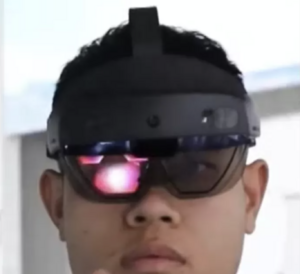
The technology of the mixed-reality headset gives the user an "in-depth understanding of the equipment without needing to touch it," the report said of the training conducted by the PLA's Eastern Theater Command, headquartered in Nanjing.[2]
In the CCTV-7 video, the PLA Air Force trainee was seen calling up the headset's operating system by raising his palm to his face. He highlighted a panel on the nearby fighter jet engine and called up interactive tools, including a drill and a wrench.
The tools were digitally overlayed on the physical surface in front of him as he stood a short distance away, simulating aircraft maintenance protocol with hand gestures, the broadcast showed.
The technology, as described in Chinese state media, was adopted to accelerate combat effectiveness and reflects China's ongoing efforts to modernize its military under President Xi Jinping.
The use of emerging technologies in the armed forces suggests China's readiness to utilize any relevant advances when practica, even those developed by the U.S., its long-term strategic competitor.
At the Reagan National Defense Forum earlier this month, U.S. Commerce Secretary Gina Raimondo said the U.S. was preparing more curbs on China to win the technology war.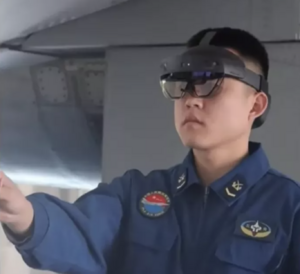
The PLA's use of Microsoft hardware sparked a flurry of comments on Chinese social media this week, with a related hashtag later trending with half a million views on Weibo, the country's X-like microblogging platform.
Microsoft also has contracts with the Pentagon for its mixed-reality. In 2021, the company agreed to supply the U.S. Army with more than 120,000 smart glasses in a deal that could reach $21.88 billion over 10 years, following an initial supply of prototypes in 2018 as part of a $480 million contract.
Meanwhile, on Capitol Hill, senior U.S. lawmakers are calling for a further tightening exports to prevent the Chinese military from accessing U.S. technologies, particularly those with so-called dual uses in the commercial and defense sectors.
Reps. Mike Gallagher and Michael McCaul, Republican House committee leaders representing Wisconsin and Texas, respectively, informed Raimondo this month that further resources for her department would be conditioned upon institutional reforms that effectively limited the flow of U.S. tech to America's adversaries.
But in China, major tech players like Xiaomi, Lenovo and Oppo are already developing their own augmented reality devices, signaling a new era of civilian and military applications for cutting-edge technology.
Sep 13, 2023 | US Army orders more Microsoft AR headsets now that they no longer make soldiers want to barf
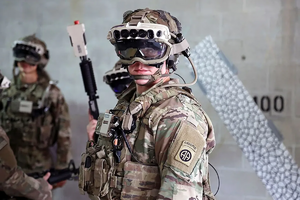
The US Army is awarding Microsoft[3][4][5] with another order of advanced mixed reality goggles designed for combat situations, Bloomberg reports. Microsoft had sent the Army a batch of 20 updated prototype headsets in late July, which were tested by two squads of soldiers in August who responded positively to improvements in its design: namely, they no longer felt nauseous and pained while wearing them.
Microsoft, in the past year, has worked with the US Army to create HoloLens-like mixed reality headsets known as the Integrated Visual Augmentation System (IVAS), but initial reports in 2022 indicated it was causing headaches, nausea, and eyestrain in testing. The problematic headsets were part of an order of 5,000 headsets the Army started taking delivery in September 2022.
The newer headsets, now on version 1.2, had “demonstrated improvements in reliability, low light sensor performance, and form factor,” Army spokesperson David Patterson tells Bloomberg. The US Army awarded Microsoft with another contract on September 5th for the new systems and to see if the company could scale production.
The US Army had asked Congress to fund its purchase of 6,900 headsets from Microsoft, but it was denied earlier this year. Instead, Congress reduced the $400 million in funding the Army requested to just $40 million to improve the system. The Army awarded Microsoft that money plus an additional $125 million to continue development.
The US Army plans to spend as much as $21.9 billion on the project, and the headset will undergo testing in 2025 by the Army for use in combat. Microsoft’s HoloLens tech continues to live on in these special military goggles, as the development of the home and work use cases of the headsets seems to have dropped off following layoffs affecting the teams involved in January.
...
Nov. 29, 2023 | Elbit to provide electro-optics night vision goggles that combine infrared and light-amplification sensors
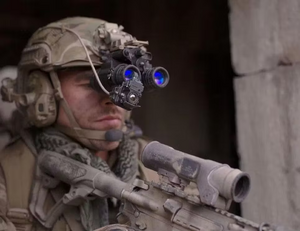
SBNVG has binocular image intensifier with a modular uncooled thermal imaging, dual-power cable, external power supply, and helmet mounting system.
U.S. Marine Corps night vision experts needed an updated helmet-mounted night vision system that combines thermal imaging and light amplification. They found their solution from Elbit Systems of America-Night Vision LLC in Roanoke, Va.[6]
Officials of the Marine Corps Systems Command at Quantico Marine Base, Va., announced a $500 million five-year contract Monday for the Squad Binocular Night Vision Goggle (SBNVG), which enhances the infantry’s lethality and situational awareness at night and in poor visibility.
The optical sensors combines several technologies to enhance the infantry warfighter's capabilities in low-light and degraded-visibility conditions. Light amplification helps illuminate targets at night, thermal imaging enhances vision in smoke and other obscurants, and the binocular design enhance the warfighter's depth perception.
On this contract Elbit will do the work in Roanoke, Va., and should be finished by November 2028. For more information contact Elbit Systems of America online at www.elbitamerica.com/night-vision, or Marine Corps Systems Command at www.marcorsyscom.marines.mil.
...
- analog device
- glowing screen
- very low FOV
- low magnification coef. (3x)
- poor image contrast
- problem of fatigue
- very few functions
- problem of the price ($25,490 for one)
...
- rifle mount only (not using Head-Up Display)
- very low FOV
- low magnification coef. (4x)
- visible laser range finder
- very few functions
...
there's no evidence for several years, perhaps just words
...
there's no evidence for several years, perhaps just words
...
there's no evidence for several years, perhaps just words
...
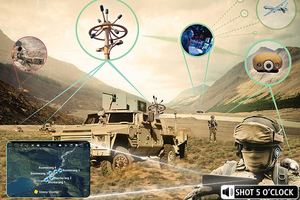
Boomerang[7][8] is a gunfire locator developed by DARPA and BBN Technologies primarily for use against snipers. Boomerang is mounted on mobile vehicles such as the Humvee, Stryker, and MRAP combat vehicles. There were plans to integrate it into the Land Warrior system. Price is $9,000.
Boomerang pinpoints the shooter’s location of incoming small arms fire. Boomerang uses passive acoustic detection and computer-based signal processing to locate a shooter in less than a second.
Whether vehicle mounted or in a fixed position, Boomerang detects small arms fire travelling toward it for bullets passing within approximately 30 meters of the mast-mounted compact array of microphones, even when shooters are firing from maximum effective weapons ranges.
When vehicle mounted, Boomerang operates whether the vehicle is moving or stationary. Non-ballistic events, such as road bumps, door slams, wind noise, tactical radio transmissions, vehicle traffic, firecrackers and urban activity do not cause false alarms. The system also does not alert when shots are fired from the vehicle or the protected site.
Fast and reliable. When a shot is detected, Boomerang immediately calls out; for example, “shot. two o’clock. 400 meters.” The o’clock position also appears on the dial while range and elevation appear on the LED display screen. When networked with a simple Ethernet connection, this information can be transmitted to an operations center or to a situation awareness platform.
Easy integration. Boomerang is easily networked and integrated with other software for enhanced battlefield management, situational awareness and force protection. Through its intuitive system integration kit and simple Ethernet interface, Boomerang can be used to slew camera devices, feed remote weapons station equipment, or report shooter position to a Tactical Operations Center.
Deployments. Boomerang is available to U.S. military and law enforcement agencies and to municipalities as well as to other approved U.S. domestic and foreign organizations. Government contractors may incorporate Boomerang into their systems or platforms.
- Protecting the military vehicles of U.S. and allied troops
- Fixed site protection for FOBs (Forward Operation Bases) and checkpoints in Afghanistan
- Protecting critical infrastructure, such as power stations, in the U.S.
Boomerang Warrior-X wearable shooter detection system, RTX (Raytheon BBN) Because our troops are most vulnerable when on foot without the cover of vehicles or buildings, Raytheon BBN developed Boomerang Warrior-X[9], a soldier wearable shooter detection system.
Boomerang Warrior-X provides immediate indication of hostile fire or sniper attack and localizes the shooter, or shooters, enabling a rapid, informed and coordinated response. The system offers the same reliable performance and features as the currently-fielded vehicle-mounted Boomerang III system — just smaller, lighter and integrated into tactical vests.
Weighing just 12 ounces, the Boomerang Warrior-X gives individual soldiers immediate awareness of hostile fire locations and, when integrated, can also provide unit leaders with shooter grid coordinates to enhance situational awareness needed to coordinate team responses to hostile fire.
Incoming shot announcements are transmitted to a built-in speaker or an earpiece while a lightweight display provides range and azimuth of the shooter position. As the soldier moves, the system compensates for the soldier’s motion and continually updates the threat’s location on the wrist display.
...
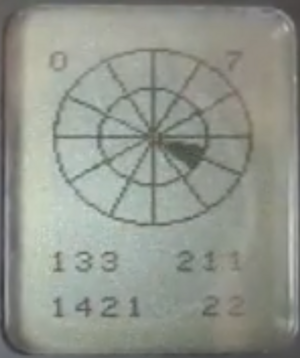
The EARS® family of gunshot localization systems gives soldiers and military police the situational awareness necessary to respond instantly and accurately to hostile attacks to better protect themselves from snipers and other gunfire threats.[10]
...
PILAR[11] Sensitive Sites Protection. PILAR Ground Version is designed for the protection of both permanent or temporary sensitive sites. A Mission System following the surveillance approach offers a configurable scalable suite consisting of:
- 1 to 20 acoustic arrays
- one ruggedized PC with MMI module for processing, data storage and display of the system outputs
The number of acoustic arrays depends on the area to be covered. Available results include among other outputs the GPS localization of the threat, as well as azimuth, elevation and range.
...
IAI Unveils New Technology for Gunfire Detection System: OTHELLO-P – Innovative, Fused Opto-Acoustic GDS
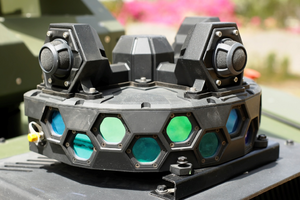
The fusion of the electro-optics (EO) technology and acoustics sensors provides the troops in the field more accurate and versatile solutions for present and future challenges. The OTHELLO-P is a light weight, low power, unique passive solution with 360-degree coverage enabling very short and accurate sensor-to-shooter loop closing, thus providing protection and neutralization of threats in the area.[12]
The acoustics-based project began in IAI’s Innovation Center, as the initiative of engineers who had previously served in the Israel Defense Forces. Their aim was to integrate acoustic capabilities into hostile fire detection systems, to enhance the identification and classification accuracy of hostile targets. In IAI’s Innovation Center, new and advanced technological capabilities are developed, and then integrated into IAI’s existing and future projects. The IAI Innovation Center encourages technological diversity, entrepreneurial initiatives, and cooperation between IAI’s Groups and startup companies. ...
MAVERICK[13] M-series solutions are low-power and quick to deploy. Suitable for both vehicle or dismounted deployment they utilise existing terrestrial transmitters to ensure constant comprehensive situational awareness in all conditions.
...
Patria MUSCL[14] is a passive radar system providing resilient, covert and easily deployable air surveillance in standalone mode as well as in networked mode using multiple Patria MUSCL stations. The system provides affordable area and point surveillance for various applications, such as air surveillance, UAV detection, critical infrastructure protection and border control.
Patria MUSCL system employs passive coherent location (PCL) technology to detect, locate and track targets meaning that it exploits external broadcasting signals as illuminators of opportunity and detects signals scattered from targets. The system does not produce a signal footprint making it practically invisible for adversaries’ signal intelligence and anti-radiation missiles as well as enabling safe deployments and use in urban areas.
Exploitation of dense network of broadcasting signals enables detection of low altitude targets with comprehensive coverage. All this combined with use of cutting-edge technologies, multi-static receiving geometry and lower operating frequencies than those utilized by conventional air surveillance radars, enable superior early warning and detection capability for aerial targets including stealth and Low-Slow-Small (LSS) targets.
...
Twinvis Passive Radar[15] - Silent surveillance of silent objects. Twinvis is a passive radar that adds a new dimension to the world of surveillance and situational awareness.
It offers decisive operational advantages: it cannot be located due to the absence of any transmitted energy and it does not need any emissions from targets to locate them.
Where conventional radar systems apply the same principle of emitting signals that are reflected by an object allowing the radar to visualise that object based on the echo received, Twinvis follows a radically different approach:
The system uses existing electromagnetic energy from radio- and TV-broadcast transmitters and evaluates their echoes when reflected by an object.
In the military field, Twinvis combines several advantages. In addition to its high mobility, the system itself remains invisible and therefore cannot be jammed or eliminated in a targeted action. At the same time, it can also be used to discover stealth aircraft which, due to their low observable technology, have until now remained undetectable for conventional radar systems.
...
...
Strategy
Strengths
Weaknesses
Opportunities
Threats
Competitive Advantages
Plan
Table: Specific | Measurable | Achieveable | Realistic | Time-related
Partners
New partners
Existing partners
Fixing weaknesses
Areas of research
- Future Sight AR or Dauntless XR
- How HoloLense is designed
- LetinAR
- Vuzix
- Nicholas C, Steadicam Gun Operator, Night Vision & Thermal Aficionado, Flashlight/Laser Enthusiast, USPSA competitor. Any questions please email him at nicholas.c@staff.thefirearmblog.com
- Technifex XR
- EolianVR
Situational Awareness
- ArcGIS ESRI
- See more on https://vulcan-sof.com/login/ng2/search/organizations by tags
Related fields
Additional:
Future ideas
Further reading
See also
| Public External Sections: | Public Wiki Sections: | Public Wiki Sections: | Not-Public Wiki Sections: |
|---|---|---|---|
Note: Unless otherwise stated, whenever the masculine gender is used, both men and women are included.
References
External links
- ↑ Breaking Defense, Army open to replacing Microsoft as prime under ‘IVAS Next,’ industry sources say (Aug 15, 2024)
- ↑ Newsweek, China's State Media Shows Military Using Microsoft's HoloLens 2 Headsets, (Dec. 14, 2023)
- ↑ The Verge, US Army orders more Microsoft AR headsets now that they no longer make soldiers want to barf, (Sep. 13, 2023)
- ↑ DefenseScoop, Army awards Microsoft $95M for additional IVAS 1.2 headsets, virtual trainers, (Sep. 21, 2023)
- ↑ Army.MIL, Army accepts prototypes of the most advanced version of IVAS, (Aug. 1, 2023)
- ↑ Militaryaerospace, Elbit to provide electro-optics night vision goggles that combine infrared and light-amplification sensors (Nov. 29, 2023)
- ↑ Wikipedia, "Boomerang (countermeasure)"
- ↑ RTX (Raytheon BBN), "Boomerang"
- ↑ Wikipedia, Boomerang
- ↑ QinetiQ, "EARS Gunshot Localization Systems"
- ↑ Metravib Defence, "PILAR Ground Version", "PILAR Helicopter Protection", "PEARL Soldier Protection", "PILAR Vehicle Protection"
- ↑ EDR Magazine, IAI Unveils New Technology for Gunfire Detection System
- ↑ Silentium Defence, Maverick M Passive Covert Radar
- ↑ Patria Group, Patria MUSCL Passive Radar System
- ↑ HENDOLDT, Twinvis Passive Radar